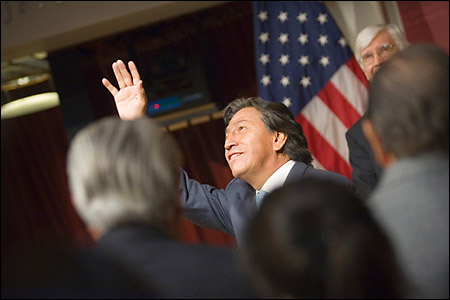Peruvian President Toledo touts his record
Stresses danger of extreme poverty for future of nation
Peruvian President Alejandro Toledo warned April 12 that poverty is the enemy of democracy in Latin America and said that despite Peru’s recent economic gains, he did not do enough to improve the lot of Peru’s poor during his five-year term.
Toledo, who was a fellow at the now-defunct Harvard Institute for International Development in the early 1990s, gave himself high marks for respect for democratic principles, such as freedom of the press, and for putting Peru’s economic house in order.
But, he said, he’s not as concerned about the “claps from Wall Street” as he is about the “shouts of anger from Main Street.” He detailed several gains in the fight against poverty during his tenure, but said that ultimately too many Peruvians remain poor.
Toledo delivered a speech titled “Economic Growth and Democracies in Latin America: The Case of Peru” at the John F. Kennedy Jr. Forum at the John F. Kennedy School of Government. The event was sponsored by the Institute of Politics.
Toledo was introduced by John Thomas, lecturer in public policy at the Kennedy School. Thomas said he got to know Toledo when he was a fellow at Harvard. Few people, Thomas said, have the pleasure of watching someone they know well go on to become president.

Thomas hailed Toledo’s humble roots – he grew up in a poor Andean town and worked shining shoes when his family moved to the city. Toledo himself described his rise as a “statistical anomaly,” detailing his attendance at U.S. colleges that resulted in a Stanford doctorate and an academic career as an economist.
Constitutionally barred from seeking a second term, Toledo called himself an “agricultural president” but said that it is his successor who will harvest gains from the economic seeds Toledo planted.
“Now that it’s green and ready to harvest, I have to go, but that’s democracy,” Toledo said.
Toledo’s successor will be chosen in a multistep process that began with elections April 9. No candidate in those elections gained a majority of the vote, so the top two candidates will vie in a runoff election in May or June. The leading candidate so far is Ollanta Humala, a former army officer who has secured a spot in the runoff election. Humala is followed by former President Alan Garcia, with 24.4 percent of the vote as of Sunday (April 16), and former Congresswoman Lourdes Flores, with 23.5 percent. Votes continue to be counted to determine whether Garcia or Flores faces Humala in the runoff.
Though Toledo’s term has been marked by charges of corruption, Peru’s economy has grown steadily under his administration. Toledo said that growth over the past five years has averaged 5.5 percent. On April 12, before appearing at the Kennedy School, he signed a free trade agreement with the United States, which, he said, will add 2 percent to Peru’s gross domestic product.
In addition, he said, international reserves are higher than they’ve ever been, the government’s budget deficit is just a half a percentage point, and inflation – which soared out of control in the 1980s – was just 1.5 percent.
International trade in agricultural products has increased, Toledo said, diversifying Peru’s trade from its heavy dependence on mining and its vulnerability to the fluctuations in international mineral prices.
Domestically, Toledo said he has followed through on promises to double teacher salaries and raise salaries of doctors and nurses. He said he believes that poverty can only be attacked by sound economic policies and the encouragement of private enterprise. Despite solid economic gains, however, he said the reduction of poverty has lagged behind other gains.
The poverty rate in Peru has fallen, to 48 percent from 54 percent, but remains far too high. The poverty rate in the rural areas is even higher, at 68 percent, though it has declined from 77 percent when Toledo took office. The number of those living in extreme poverty – on less than $1 per day – has also fallen, to 18 percent from 24 percent.
Toldeo acknowledged his poor public approval ratings, which fell to as low as 10 percent, and said more needs to be done to both alleviate poverty and increase social equity. Despite negative press coverage of his administration, Toledo said he maintained his respect for democratic institutions such as freedom of the press and, unlike previous Peruvian leaders, has respected human rights, saying, “These hands are not tainted with blood.”
Toledo said that after the abuses of his predecessor, Alberto Fujimori, the fact that Peru’s April 9 election was held fairly means that there has already been a winner in the Peruvian election: democracy.
Though Toledo leaves office this year, he warned his successor not to try to restore authoritarian rule.
“I’m a soldier, I’m a fighter for democracy. If someone tries to undermine democracy, I will be once again in the streets,” Toledo said. “In Latin America, it’s not enough to be elected democratically, we have to govern democratically.”




